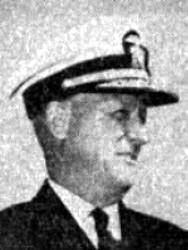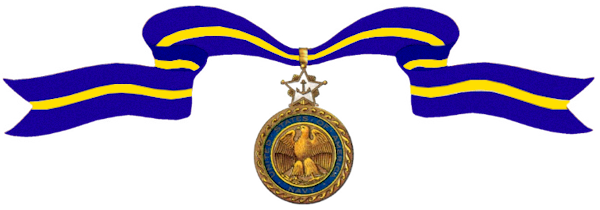Carleton Bryant graduated from the U.S. Naval Academy at Annapolis, Class of 1914. He retired as a U.S. Navy Vice Admiral.

Awards Received
-

Legion of Merit
-

Legion of Merit
-

Legion of Merit
-

Silver Star
-

Navy Distinguished Service Medal
-
Legion of Merit

The President of the United States of America takes pleasure in presenting a Second Gold Star in lieu of a Third Award of the Legion of Merit with Combat “V” to Rear Admiral Carleton Fanton Bryant, United States Navy, for exceptionally meritorious conduct in the performance of outstanding services to the Government of the United States while acting as an Atlantic Fleet Escort Commander engaged in escort of Trans-Atlantic Convoys during World War II. As an Atlantic Fleet Task Group Commander, he conducted the escort operations with utmost skill and success. The successful accomplishment of this exacting and difficult task, despite the hazards of enemy submarine infested waters and adverse weather, resulted in the transportation of men and supplies to sustain the Allied war fronts in Europe and thereby contributed materially to the prosecution and winning of the war. His sound judgment, professional skill and outstanding performance of duty reflect great credit upon himself and upheld the highest traditions of the United States Naval Service. (Rear Admiral Bryant is authorized to wear the Combat “V”.)
-
Legion of Merit

The President of the United States of America takes pleasure in presenting a Gold Star in lieu of a Second Award of the Legion of Merit with Combat “V” to Rear Admiral Carleton Fanton Bryant, United States Navy, for exceptionally meritorious conduct in the performance of outstanding services to the Government of the United States as Commander of the Center Support Group of the Western Naval Task Force during the amphibious invasion of Southern France in August 1944. Rear Admiral Bryant, displaying qualities of outstanding skill and aggressive leadership, carried out the mission of his task group with extreme effectiveness in supporting by shore bombardment the assault landings of elements of the U.S. SEVENTH Army over selected beaches along the Coast of Southern France. In well coordinated action with Allied bombardment units and aircraft of the Mediterranean Allied Air Force, he conducted accurate and destructive fire against beach defenses, coastal positions, and other enemy strong points, and thereby contributed materially to the success of the invasion and to the rapid advance of the assault forces into enemy occupied territory. The exceptional ability, cool and dependable action, and outstanding devotion to duty displayed by Rear Admiral Bryant reflected great credit upon himself and the Naval Service. (Rear Admiral Bryant is authorized to wear the Combat “V”.)
-
Legion of Merit

The President of the United States of America takes pleasure in presenting the Legion of Merit with Combat “V” to Rear Admiral Carleton Fanton Bryant, United States Navy, for exceptionally meritorious conduct in the performance of outstanding services to the Government of the United States as the commander of the Gunfire Support Group of the Assault Force “O” during the amphibious invasion of the coast of Normandy, France, commencing on 6 June 1944. Rear Admiral Bryant operated his forces during the assault period of the invasion of Normandy with skill and determination. The careful planning and effective execution of the fire support of his forces contributed immensely to the successful assault of the FIRST U.S. Army on the beaches in the Vierville-Colleville Area. On 25 June 1944, Rear Admiral Bryant, with battleships and destroyers under his command, took part in the naval gunfire against enemy strongpoints in the vicinity of Cherbourg in support of the advance of the FIRST U.S. Army on that port. This fire was skillfully delivered in the face of determined enemy opposition. The able leadership and determination in the face of opposition displayed by Rear Admiral Bryant reflected great credit upon himself and upheld the highest traditions of the United States Naval Service. (Rear Admiral Bryant is authorized to wear the Combat “V”.)
-
Silver Star
Service:
United States NavyRank:
Rear AdmiralDivision:
U.S.S. Texas (BB-35)Action Date:
June 25, 1944
The President of the United States of America takes pleasure in presenting the Silver Star to Rear Admiral Carleton Fanton Bryant, United States Navy, for personal bravery, coolness in the face of heavy action, and consistently intelligent leadership while in command of a task group which participated in the Bombardment of Cherbourg, 15 June 1944. In spite of extremely heavy fire from enemy batteries which out-ranged his ships and which damaged four of the seven ships under his command, including his flagship, the U.S.S. TEXAS (BB-35), Admiral Bryant continued to deliver effective fire and contributed directly and materially to the success of the action. His gallant actions and dedicated devotion to duty, without regard for his own life, were in keeping with the highest traditions of military service and reflect great credit upon himself and the United States Naval Service.
-
Navy Distinguished Service Medal
Service:
United States NavyRank:
Rear AdmiralAction Date:
November 1944 – January 1946
The President of the United States of America takes pleasure in presenting the Navy Distinguished Service Medal to Rear Admiral Carleton Fanton Bryant, United States Navy, for exceptionally meritorious and distinguished service in a position of great responsibility to the Government of the United States as Commander Fleet Operational Training Command, United States Atlantic Fleet from November 1944 to January 1946. Rear Admiral Bryant, faced with the tremendous task of providing initial training to ships of the Fleet and keeping them abreast of new developments, exhibited rare skill and unexcelled judgment in the formulation and execution of comprehensive plans designed to carry out the function of the Fleet Operational Training Command. His forceful leadership, thorough knowledge and sound solutions of the problems of such an unparalleled training program were reflected in the increased operational readiness and combat effectiveness of the Navy in all theaters of war. Rear Admiral Bryant’s extreme efficiency, complete devotion to duty and exceptionally meritorious service contributed greatly to the successful prosecution of the war and his achievements reflect great credit upon himself and the United States Naval Service.

